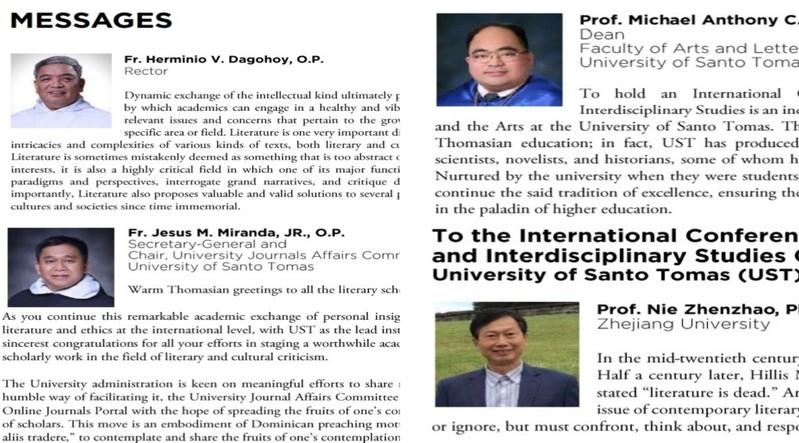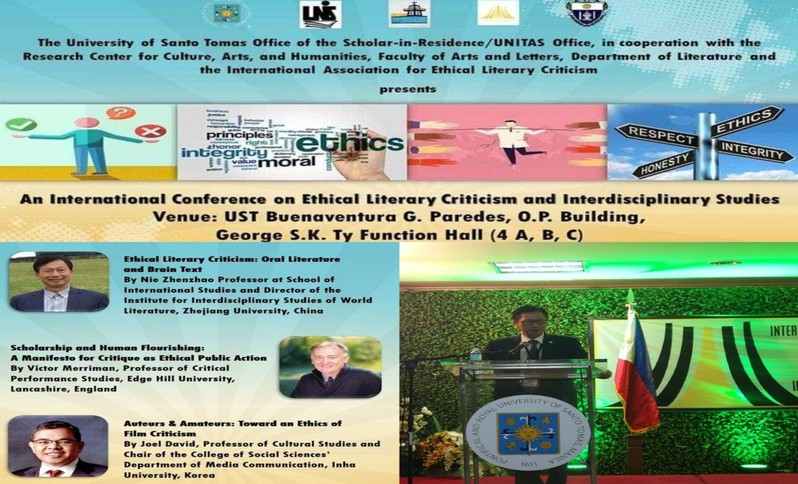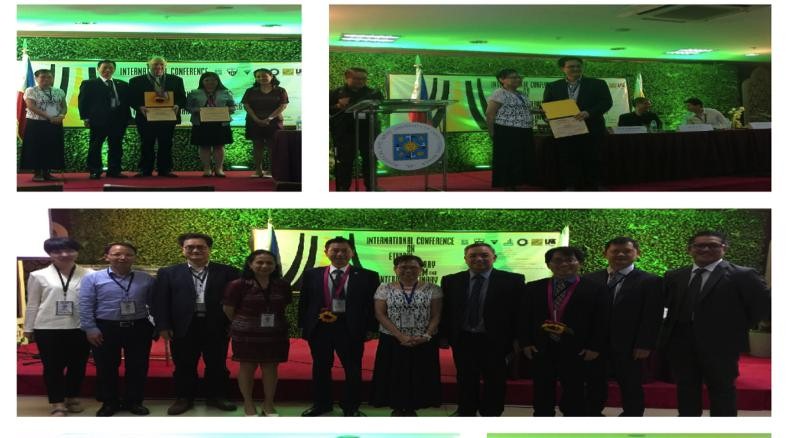From April 26 to 30, the Fourth International Forum on “Ethical Literary Criticism and Interdisciplinary Studies” was held at University of Santo Tomas. Founded in 1611, the University is the oldest among Asian universities and one of the four famous universities in the Philippines. The Forum was co-hosted by Center for Interdisciplinary Studies of World Literature of Zhejiang University, the International Society of Ethical Literary Criticism and Interdisciplinary Studies of Literature, and undertaken by School of Arts, Research Center for Culture, Arts and Humanities of University of Santo Tomas and UNITAS. Prof. Nie Zhenzhao and Prof. Wu Di, Director and Vice Director of Center for Interdisciplinary Studies of World Literature of Zhejiang University, led the team to the Forum and gave keynote speeches. Present at the Forum were more than 200 scholars from countries including China, Britain, South Korea, Malaysia and the Philippines, among whom were President Herminio V. Dagohov, Secretary-General Jesus Miranda and Chairman Jesus M. Miranda of Committee of Periodicals, University of Santo Tomas.
After his welcome speech on behalf of the University, Present Dagohov briefly introduced the background of the high-level forum. He stressed the critical significance of the ethical literary criticism theories in current society from the functions and cultural communication of literature, and appreciated Prof. Nie Zhenzhao’s viewpoint on literature’s instructive functions. Prof. Maria Luisa Torres Reyes from the University of Santo Tomas reviewed the origination and development of ethical perspective in the history of literary criticism and its being neglected nowadays. Later, she introduced the core concept of ethical literary criticism proposed by Prof. Nie Zhenzhao, and highlighted its significance and guiding role in real life.

With ethical literary criticism and interdisciplinary studies as the theme, the Forum centered on five topics, namely, “Ethics, Theory and Method”, “Ethics and European-American Literature”, “On the Ethical Issues of Nick Joaquin’s Works”, “Ethics, Asia and Transnational Ethic” and “Ethics, Criticism and philosophy”.
In his keynote speech entitled Ethical Literary Criticism: Oral Literature and Brain Text, Prof. Nie Zhenzhao reinterpreted “oral literature” after reflecting on the concept. He also proposed that the reserve and dissemination of the oral literature depends on brain text instead of characters. Besides, he put forward the concept “brain text” on the basis of this important finding, which could be classified into three types due to their forms and dissemination modes. In the Q&A session hosted by Prof. Shang Biwu from Shanghai Jiao Tong University, Prof. Nie Zhenzhao had a heated discussion with participants in terms of the ethical significance and value of oral literature, non-character literature and ethical structure and value of art works.

In his speech entitled A Study of the Ethical Conflict between the Divine Factor and the Human Factor in The Scarlet Letter, Prof. Wu Di reinterpreted the ethical issues hidden in the classic text from the perspective of literary ethics. Prof. Yang Gexin gave a speech From Ethical Criticism to Ethical literary Criticism: the Predicaments and outlets of American Ethical Literary Criticism, in which the origins of ethical literary criticism and the breakthrough and development in American ethical criticism tradition were dated back in its broad history. By analyzing examples of literary texts in novels and plays in terms of ethical literary criticism, Prof. Shang Biwu from Shanghai Jiao Tong University and Prof. Liu Maosheng and Associate Prof. Zheng Jie from Guangdong University of Foreign Studies discussed the new interpretations and literary findings which emerged after the use of ethical literary criticism methods. With interests roused by the enlightening reports, experts had warm exchanges with reporters on core concepts of literary ethics involved, namely “brain text”, “ethical identity” and “Sphinx factor”.

The closing remarks was given by Michael Anthony C. Vasco, President of School of Arts and Humanities from University of Santo Tomas. He highlighted that this Forum was of significance as it was a high-level international forum on literary criticism co-hosted by University of Santo Tomas and the International Society of Ethical Literary Criticism in the Philippines. He also appreciated all the participants for their support in the university and the Forum, and hoped more academic exchanges would be achieved.
Meanwhile, the second “The Belt and Road” Summit Forum on International Cooperation was held in Beijing and the Forum held these days was in active response to “The Belt and Road Initiative”. The Third High-Level International Forum was held at Korea University, South Korea last year. Concentrating on the ethical literary criticism theories proposed by Prof. Nie Zhenzhao, the Fourth International Forum discussed the ethical issues and interdisciplinary research methods in European and Asian literature which reflect the ethical dimension of practical problems all over the world. The Forum came to a conclusion that it’s crucial and extremely urgent to reconsider ethical issues in literary works. Its success not only promoted Chinese literary criticism theories to go global, but proved the academic value and vitality of ethical literary criticism and that Chinese original theories are leading international academic circle step by step. Universities including Hue Normal University, Vietnam, Korea University, South Korea and University of Ljubljana indicate that they would actively organize international high-level forums on ethical literary criticism and interdisciplinary studies, as the global influence of ethical literary criticism are increasing.
Center for Interdisciplinary Studies of World Literature, Zhejiang University
May 6, 2019
Translated by Li Jia and Shang Xiaoyi
Edited by Xu Xueying



